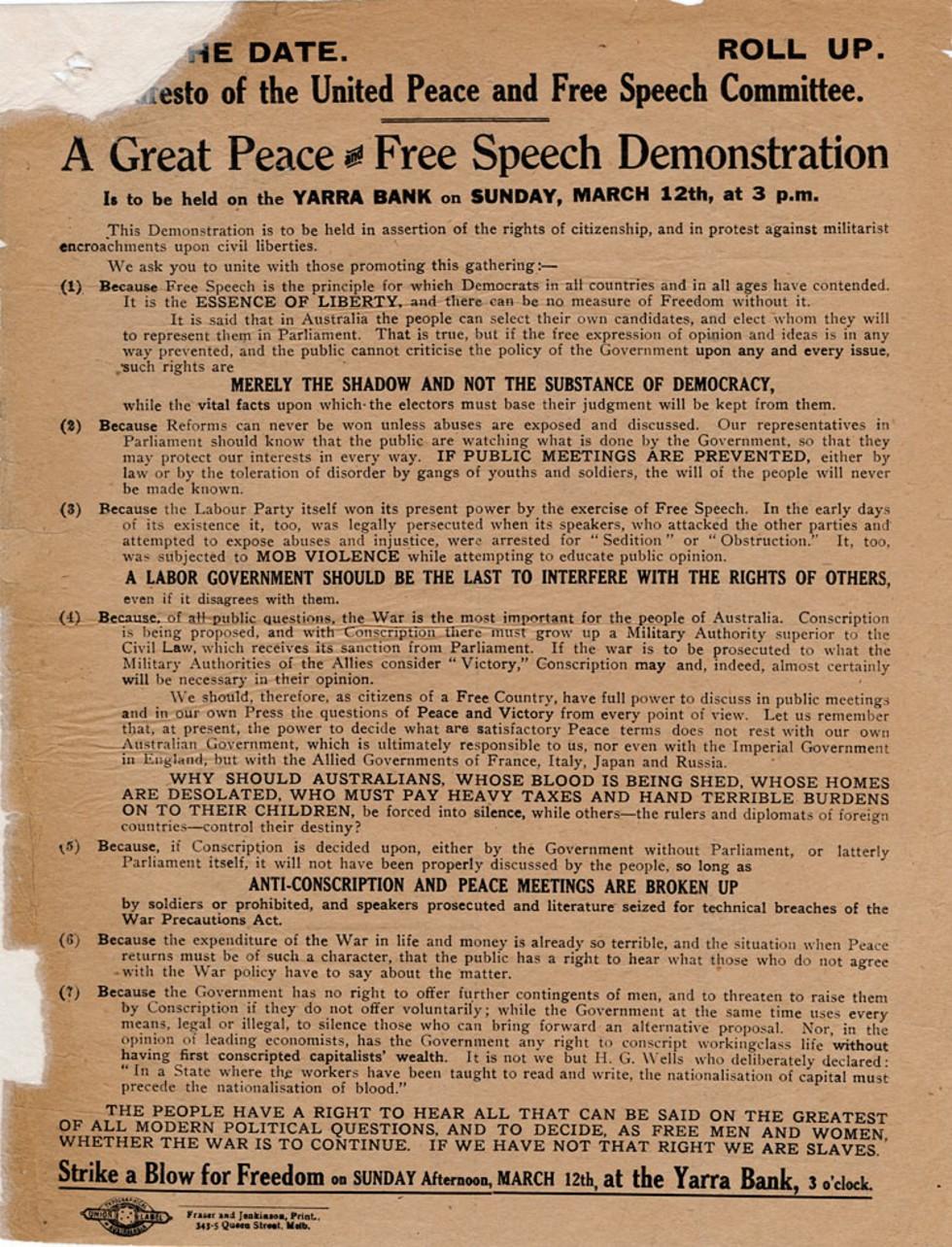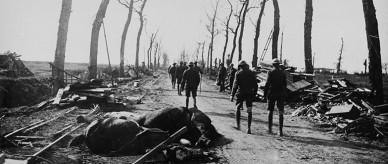


Transcript
[Illegible due to torn page] THE DATE. ROLL UP.
[Heading:] Manifesto of the United Peace and Free Speech Committee.
[dividing line.]
[Heading:] A Great Peace and Free Speech Demonstration
[Large bold text:] Is to be held on the YARRA BANK on SUNDAY, MARCH 12th, at 3.p.m.
This Demonstration is to be held in assertion of the rights of citizenship, and in protest against militarist encroachments upon civil liberties.
We ask you to unite with those promoting this gathering: -
(1) [bold] Because [end bold] Free Speech is the principle for which Democrats in all countries and in all ages have contended. It is the [bold] ESSENCE OF LIBERTY [end bold], and there can be no measure of Freedom without it.
It is said that in Australia the people can select their own candidates, and elect whom they will to represent them in Parliament. That is true, but if the free expression of opinion and ideas is in any way prevented and the public cannot criticise the policy of the Government [bold] upon any and every issue [end bold], such rights are
[large bold text] MERELY THE SHADOW AND NOT THE SUBSTANCE OF DEMOCRACY, [end large text]
while the [bold] vital facts [end bold] upon which the electors must base their judgment will be kept from them.
(2) [bold] Because [end bold] Reforms can never be won unless abuses are exposed and discussed. Our representatives in Parliament should know that the public are watching what is done by the Government, so that they may protect our interests in every way. [bold] IF PUBLIC MEETINGS ARE PREVENTED [end bold], either by law or by the toleration of disorder by gangs of youths and soldiers, the will of the people will never be made known.
(3) [bold] Because [end bold] the Labour Party itself won its present power by the exercise of Free Speech. In the early days of its existence it, too, was legally persecuted when its speakers, who attacked the other parties and attempted to expose abuses and injustice, were arrested for “Sedition” or “Obstruction.” It, too, was subjected to [bold] MOB VIOLENCE [end bold] while attempting to educate public opinion.
[large bold text] A LABOR GOVERNMENT SHOULD BE THE LAST TO INTERFERE WITH THE RIGHTS OF OTHERS, [end large text]
even if it disagrees with them.
(4) [bold] Because, [end bold] of all public questions, the War is the most important for the people of Australia. Conscription is being proposed, and with Conscription there must grow up a Military Authority superior to the Civil Law, which receives its sanction from Parliament. If the war is to be prosecuted to what the Military Authorities of the Allies consider “Victory,” Conscription [bold] may [end bold] and, indeed, almost certainly will be necessary in their opinion.
We should, therefore, as citizens of a Free Country, have full power to discuss in public meetings and in our own Press the questions of [bold] Peace and Victory [end bold] from every point of view. Let us remember that, at present, the power to decide what are satisfactory Peace terms does not rest with our own Australian Government, which is ultimately responsible to us, nor even with the Imperial Government in England, but with the Allied Governments of France, Italy, Japan and Russia.
[bold] WHY SHOULD AUSTRALIANS, WHOSE BLOOD IS BEING SHED, WHOSE HOMES ARE DESOLATED, WHO MUST PAY HEAVY TAXES AND HAND TERRIBLE BURDENS ON TO THEIR CHILDREN, [end bold] be forced into [bold] silence [end bold], while others – the rulers and diplomats of foreign countries – control their destiny?
(5) [bold] Because, [end bold] if Conscription is decided upon, either by the Government without Parliament, or latterly Parliament itself, it will not have been properly discussed by the people [bold] so long as
[large text] ANTI-CONSCRIPTION AND PEACE MEETINGS ARE BROKEN UP [end large text]
by soldiers or prohibited, and speakers prosecuted and literature seized for technical breaches of the War Precautions Act. [end bold]
(6) [bold] Because [end bold] the expenditure of the War in life and money is already so terrible, and the situation when Peace returns must be of such a character, that the public has a right to hear what those who do not agree with the War policy have to say about the matter.
(7) [bold] Because [end bold] the Government has no right to offer further contingents of men, and to threaten to raise them by Conscription if they do not offer voluntarily; while the Government at the same time uses every means, legal or illegal, to silence those who can bring forward an alternative proposal. Nor, in the opinion of leading economists, has the Government any right to conscript workingclass [sic] life [bold] without having first conscripted capitalists’ wealth. [end bold] It is not we but H.G. Wells who deliberately declared: “In a State where the workers have been taught to read and write, the nationalisation of capital must precede the nationalisation of blood.”
[Large bold text] THE PEOPLE HAVE A RIGHT TO HEAR ALL THAT CAN BE SAID ON THE GREATEST OF ALL MODERN POLITICAL QUESTIONS, AND TO DECIDE, AS FREE MEN AND WOMEN, WHETHER THE WAR IS TO CONTINUE. IF WE HAVE NOT THAT RIGHT WE ARE SLAVES.
[Larger text, underlined:] Strike a Blow for Freedom on SUNDAY Afternoon, MARCH 12th, at the Yarra Bank, 3 o’clock.
[Logo of printing company, labelled ‘Fraser and Jenkinson, Print.’]
About this record
This is a leaflet prepared by the United Peace and Free Speech Committee of Victoria, encouraging public attendance at a demonstration to be held at 3 pm on 12 March 1916 on the banks of the Yarra River in Melbourne. It states that the meeting is to assert the ‘rights of citizenship’ and protest against ‘militarist encroachments upon civil liberties’ (referring to government action to break up anti-conscription meetings). The leaflet urges the public to attend in support of the cause and in the name of free speech and democracy.
Educational value
- The United Peace and Free Speech Committee of Victoria was one of a number of organisations active during the First World War. This leaflet was part of a campaign that encouraged people to speak out against the restrictions placed on citizens’ freedoms by the War Precautions Act 1914. It champions the rights of citizens to debate Australia’s role in the war—stating that, without these rights, ‘we are slaves’.
- This document is part of a series of files held by the National Archives of Australia related to investigations of criminal offences against the Commonwealth and to the activities of outspoken anti-conscriptionists. This included Adela Pankhurst, an active member of the Women’s Peace Army, who arrived in Australia from England in 1914. Pankhurst came from a family of left-wing activists which included her mother Emmeline Pankhurst, the well-known British women’s suffrage campaigner.
- According to government reports at the time, the 12 March rally was attended by at least 2000 people and included three hours of speeches by members from the No-Conscription Fellowship, the Industrial Workers of the World (IWW), the Amalgamated Society of Carpenters and Joiners of Australia and Adela Pankhurst, among others. Pankhurst spoke to a sympathetic crowd for half an hour. Volunteer soldiers at the rally were said to have tried to silence her, to no avail.
- The War Precautions Act 1914 mentioned in the leaflet granted the Commonwealth extended powers during the First World War. Government representatives considered using the Act to deport Pankhurst following the rally, on the basis that she was a ‘menace to the peace of the community’. While Pankhurst evaded deportation, she was gaoled several times for various offences, including ‘incitement’ and ‘offensive behaviour’.
- The rally advertised in this leaflet came seven months before a plebiscite on conscription, called by wartime Labor Prime Minister William Morris ‘Billy’ Hughes because enlistment numbers were falling. However, the 1916 vote was defeated 51 to 49 per cent. Hughes, a fervent supporter of conscription, held a second plebiscite on the issue in 1917. Public debate was heated, and the margin widened in the second vote—which virtually closed the conscription debate for some 20 years.
- The language used in this leaflet is typical of the emotive tone used in both the pro- and anti-conscription campaigns of 1916 and 1917. The anti-conscription campaign was run on many fronts. Civil libertarians and pacifists alike used the argument that public debate over the issue was being stifled and that encroaching on freedom of speech and association was undemocratic.
Acknowledgments
Learning resource text © Education Services Australia Limited and the National Archives of Australia 2010.
Related themes
Need help with your research?
Learn how to interpret primary sources, use our collection and more.




